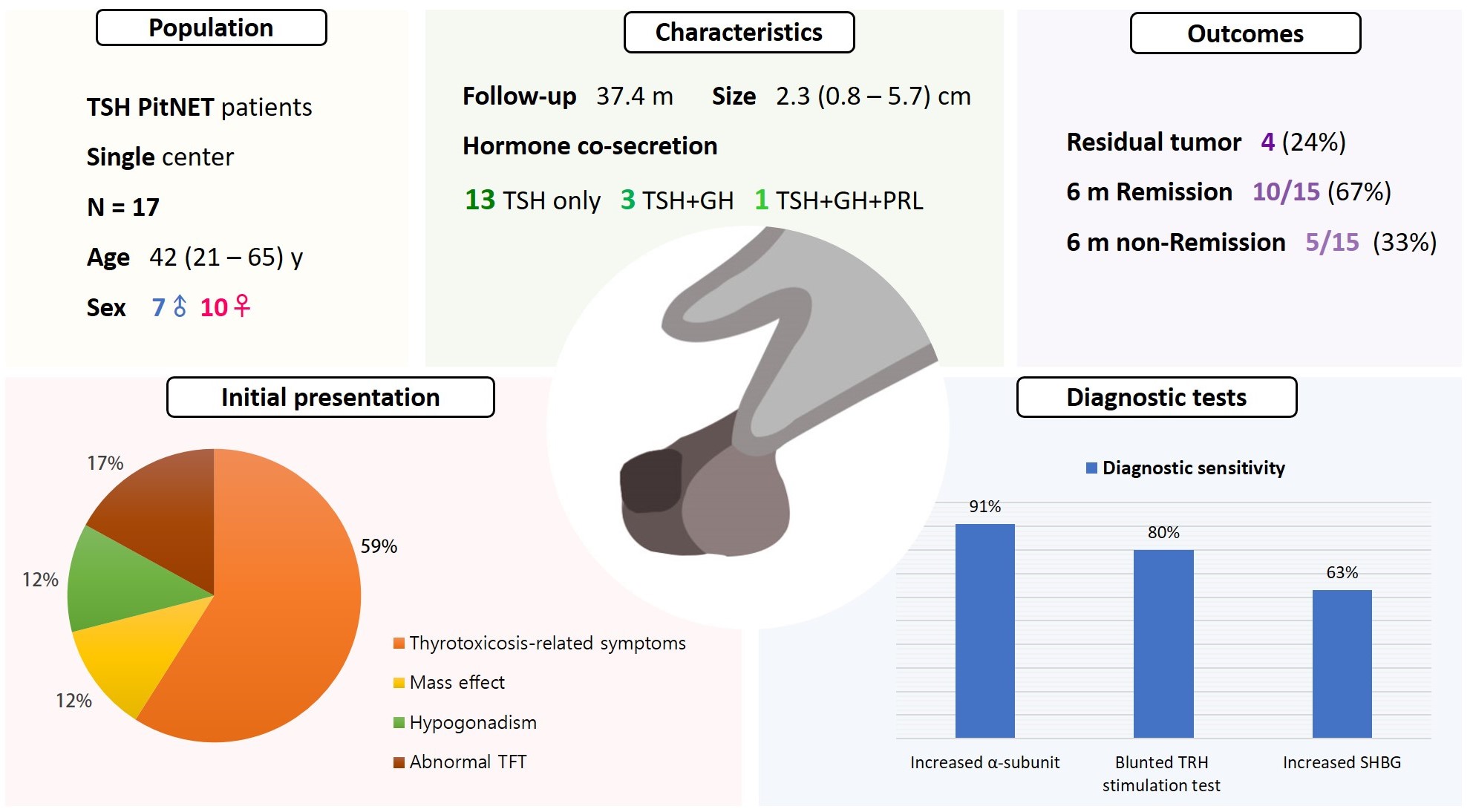Search
- Page Path
- HOME > Search
Original Article
- Hypothalamus and pituitary gland
- Clinical Characteristics, Diagnosis, and Treatment of Thyroid Stimulating Hormone-Secreting Pituitary Neuroendocrine Tumor (TSH PitNET): A Single-Center Experience
- Jung Heo, Yeon-Lim Suh, Se Hoon Kim, Doo-Sik Kong, Do-Hyun Nam, Won-Jae Lee, Sung Tae Kim, Sang Duk Hong, Sujin Ryu, You-Bin Lee, Gyuri Kim, Sang-Man Jin, Jae Hyeon Kim, Kyu Yeon Hur
- Endocrinol Metab. 2024;39(2):387-396. Published online February 5, 2024
- DOI: https://doi.org/10.3803/EnM.2023.1877

- 1,572 View
- 52 Download
-
 Abstract
Abstract
 PDF
PDF Supplementary Material
Supplementary Material PubReader
PubReader  ePub
ePub - Background
Thyroid-stimulating hormone (TSH)-secreting pituitary neuroendocrine tumor (TSH PitNET) is a rare subtype of PitNET. We investigated the comprehensive characteristics and outcomes of TSH PitNET cases from a single medical center. Also, we compared diagnostic methods to determine which showed superior sensitivity.
Methods
A total of 17 patients diagnosed with TSH PitNET after surgery between 2002 and 2022 in Samsung Medical Center was retrospectively reviewed. Data on comprehensive characteristics and treatment outcomes were collected. The sensitivities of diagnostic methods were compared.
Results
Seven were male (41%), and the median age at diagnosis was 42 years (range, 21 to 65); the median follow-up duration was 37.4 months. The most common (59%) initial presentation was hyperthyroidism-related symptoms. Hormonal co-secretion was present in four (23%) patients. Elevated serum alpha-subunit (α-SU) showed the greatest diagnostic sensitivity (91%), followed by blunted response at thyrotropin-releasing hormone (TRH) stimulation (80%) and elevated sex hormone binding globulin (63%). Fourteen (82%) patients had macroadenoma, and a specimen of one patient with heavy calcification was negative for TSH. Among 15 patients who were followed up for more than 6 months, 10 (67%) achieved hormonal and structural remission within 6 months postoperatively. A case of growth hormone (GH)/TSH/prolactin (PRL) co-secreting mixed gangliocytoma-pituitary adenoma (MGPA) was discovered.
Conclusion
The majority of the TSH PitNET cases was macroadenoma, and 23% showed hormone co-secretion. A rare case of GH/TSH/PRL co-secreting MGPA was discovered. Serum α-SU and TRH stimulation tests showed great diagnostic sensitivity. Careful consideration is needed in diagnosing TSH PitNET. Achieving remission requires complete tumor resection. In case of nonremission, radiotherapy or medical therapy can improve the long-term remission rate.

Case Reports
- A Case of Coexistence of Parathyroid and Papillary Thyroid Carcinoma.
- Yoon Shick Yom, Myung Jun Lee, Hyun Woo Lim, Jeong Ho Park, Sung Tae Kim, Yu Mi Lee, Dong Ju Yang, Youn Zoo Cho, Moon Il Park, Kang Woo Lee, Keun Young Park, Dong Mee Lim, Byung Joon Kim
- J Korean Endocr Soc. 2010;25(1):61-67. Published online March 1, 2010
- DOI: https://doi.org/10.3803/jkes.2010.25.1.61
- 1,678 View
- 25 Download
-
 Abstract
Abstract
 PDF
PDF - Primary hyperparathyroidism is usually caused by a parathyroid adenoma, occasionally by primary parathyroid hyperplasia and rarely by parathyroid carcinoma. Coincidental occurrence of thyroid carcinoma in parathyroid adenoma is not uncommon, but synchronous parathyroid and thyroid carcinoma is extremely rare. Here, we describe a case of synchronous parathyroid carcinoma and papillary thyroid carcinoma.

- A Case of Prolonged Hypoglycemia Post Topiramate Treatment an Anti-convulsant, in a Type 2 Diabetic Patient.
- Myung Jun Lee, Yoon Shick Yom, Hyun woo Lim, Sung Tae Kim, Yu Mi Lee, Youn Zoo Cho, Kang Woo Lee, Byung Joon Kim, Keun Young Park, Dong Mee Lim
- J Korean Endocr Soc. 2009;24(4):277-280. Published online December 1, 2009
- DOI: https://doi.org/10.3803/jkes.2009.24.4.277
- 3,794 View
- 96 Download
-
 Abstract
Abstract
 PDF
PDF - Topiramate is a drug used to treat epilepsy, and is known for its effects including reduced appetite resulting in lower body weight, and the lowering of neutral fat. In addition, topiramate is known to reduce blood sugar levels by increasing insulin sensitivity and by increasing insulin secretion by glucose stimulation. The authors report a case of persistent hypoglycemia, in a patient who had been administrating topiramate, as a treatment for epilepsy following an episode of cerebral infarction.


 KES
KES
 First
First Prev
Prev



